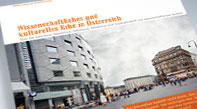Scientific and cultural heritage in Austria: A study.
On the definition, collection, acquisition, preservation and availability of academic sources
a study commissioned by the Austrian Council for Research and Technology Development (RFTE) and the Austrian Ministry of Education, Science and Culture (BM:BWK).
The study reveals
- how the concept "scientific and cultural heritage" can be pragmatically defined;
- how to possibly increase the efficiency of institutions, processes and funding with respect to retrieval, processing and preservation;
- which additional steps should be taken in these fields, especially in humanities, social sciences and cultural studies;
- which data sources should be worked on first;
- which research areas require expansion and which areas should be focussed on;
- which measures make sense in the areas of archiving and digitalisation;
- which educational measures make sense for specialists in the areas of retrieval, processing and storage;
- which related European research programmes already exist, and whether programmes could be influenced in the future so that they include an Austrian focus on "cultural and scientific heritage".
We propose a strategy to deal with the aforementioned questions as well as further steps to pursue in more depth. To sum up, we aim to name the elements of scientific and cultural heritage, to formulate goals and priorities for further development, and to decide on the organisational framework.
Culture and cultural heritage in their broadest sense are categories which are in practice problematic, since any of their appearances in life must be strictly protected. Likewise, constraining the notion to leading civilisations does not make much sense. Hence, the study suggests leaving behind a normative definition of cultural heritage and rather to focus on a variety of leading concepts (contextuality, heterogeneity, processes, interdisciplinarity, mediation), which shall provide a basis for future activities.
The recommendations were based on individual participations collected in 63 interviews with experts, as well as questionnaires, best-practice examples and a situation analysis.















